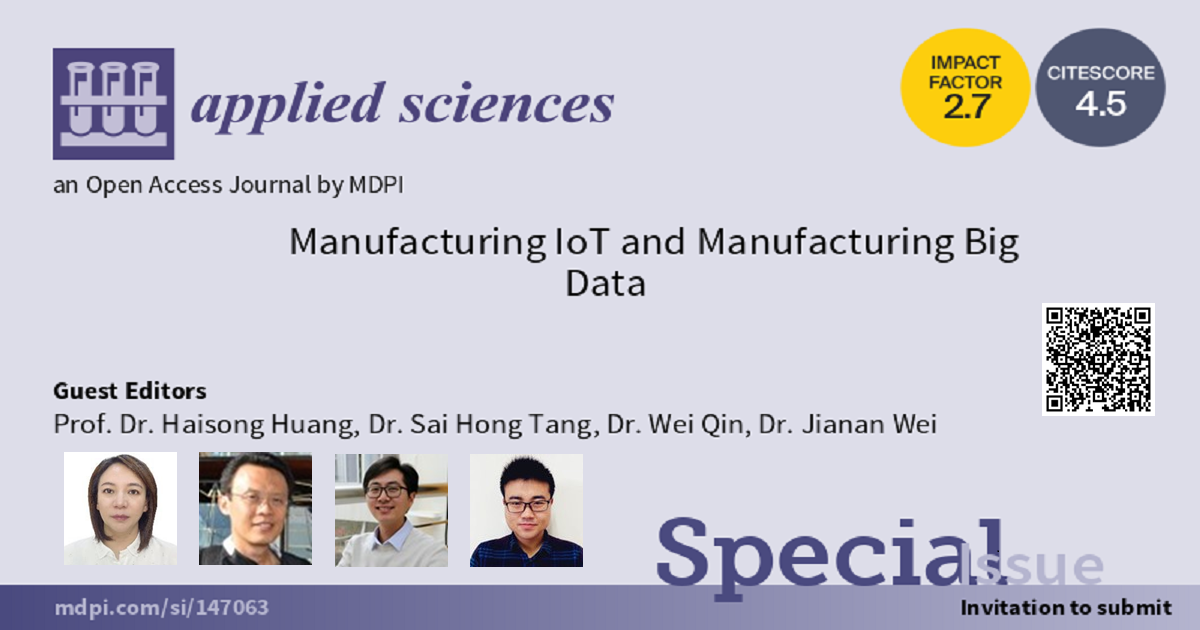Manufacturing IoT and Manufacturing Big Data
A special issue of Applied Sciences (ISSN 2076-3417). This special issue belongs to the section "Mechanical Engineering".
Deadline for manuscript submissions: closed (31 December 2023) | Viewed by 4827

Special Issue Editors
Interests: intelligent manufacturing; manufacturing big data and manufacturing information systems
Special Issues, Collections and Topics in MDPI journals
Interests: mechanical and system engineering; operation research and robotics
Interests: complex system: modeling, control and optimization; machine intelligence: AGI, SI, EA, MAS, etc.; smart manufacturing
Interests: manufacturing big data and manufacturing information systems; intelligent manufacturing; machine learning; deep transfer learning; fault diagnosis; imbalanced data processing and predictive maintenance
Special Issues, Collections and Topics in MDPI journals
Special Issue Information
Dear Colleagues,
We are inviting submissions to the Special Issue on “Manufacturing IoT and Manufacturing Big Data”. The Special Issue aims to provide a high-level international publishing platform for experts and scholars to report the newest developments and latest practice in manufacturing IoT, manufacturing big data, smart manufacturing, and industrial engineering and logistics. The Special Issue will focus on the state-of-the-art theories and technologies of manufacturing IoT, big data for smart manufacturing, digital-twin-driving intelligent manufacturing, industrial engineering and intelligent logistics (exploring how the emerging technologies utilize the concept of smart production), and innovative design and service in manufacturing, including but not limited to the following topics:
- Intelligent manufacturing method systems for industrial big data, manufacturing big data analysis models and algorithms (e.g., imbalanced learning, few-shot learning, positive-unlabeled (PU) learning, zero-shot learning, and modeling methods under various operating conditions), new generation of artificial intelligence methods, etc.;
- Manufacturing big data perception, manufacturing big data integration, manufacturing big data modeling, CPS technology, manufacturing data platforms, edge computing, etc.;
- Intelligent product design, intelligent workshop analysis and optimization, intelligent product operation and maintenance, PHM and predictive maintenance, digital-twin-driving intelligent manufacturing, intelligent logistics, etc.;
- Industrial digitalization and digital industrialization: models, algorithms, and scenarios of big data and real economy, key technologies for marketization of data elements, etc.
Prof. Dr. Haisong Huang
Dr. Sai Hong Tang
Dr. Wei Qin
Dr. Jianan Wei
Guest Editors
Manuscript Submission Information
Manuscripts should be submitted online at www.mdpi.com by registering and logging in to this website. Once you are registered, click here to go to the submission form. Manuscripts can be submitted until the deadline. All submissions that pass pre-check are peer-reviewed. Accepted papers will be published continuously in the journal (as soon as accepted) and will be listed together on the special issue website. Research articles, review articles as well as short communications are invited. For planned papers, a title and short abstract (about 100 words) can be sent to the Editorial Office for announcement on this website.
Submitted manuscripts should not have been published previously, nor be under consideration for publication elsewhere (except conference proceedings papers). All manuscripts are thoroughly refereed through a single-blind peer-review process. A guide for authors and other relevant information for submission of manuscripts is available on the Instructions for Authors page. Applied Sciences is an international peer-reviewed open access semimonthly journal published by MDPI.
Please visit the Instructions for Authors page before submitting a manuscript. The Article Processing Charge (APC) for publication in this open access journal is 2400 CHF (Swiss Francs). Submitted papers should be well formatted and use good English. Authors may use MDPI's English editing service prior to publication or during author revisions.
Benefits of Publishing in a Special Issue
- Ease of navigation: Grouping papers by topic helps scholars navigate broad scope journals more efficiently.
- Greater discoverability: Special Issues support the reach and impact of scientific research. Articles in Special Issues are more discoverable and cited more frequently.
- Expansion of research network: Special Issues facilitate connections among authors, fostering scientific collaborations.
- External promotion: Articles in Special Issues are often promoted through the journal's social media, increasing their visibility.
- e-Book format: Special Issues with more than 10 articles can be published as dedicated e-books, ensuring wide and rapid dissemination.
Further information on MDPI's Special Issue polices can be found here.








